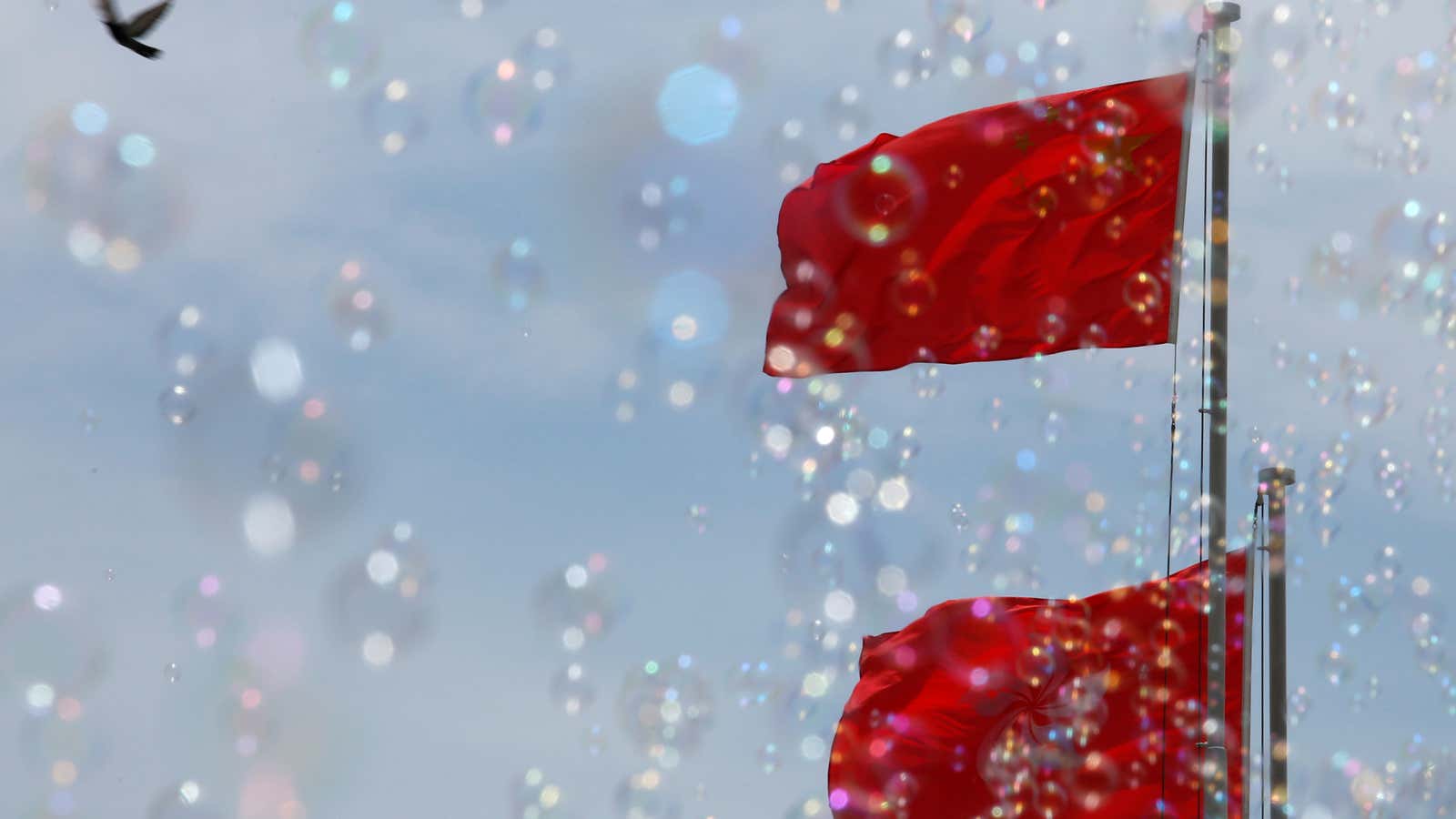A proposed law that aims to promote respect for one song is causing anxiety to many in Hong Kong about what is expected of them whenever they hear that melody in future.
The song is March of the Volunteers, the national anthem of the People’s Republic of China. Recently, the Hong Kong government tabled a bill (pdf) that mirrors one enacted in mainland China in 2017. It stipulates how the national anthem should be played and sung, and that schools—including international schools—bear the responsibility of teaching students the song. It proposes making intentional public insults of the anthem a criminal offense that can be punished by up to three years in jail and up to HK$50,000 ($6,380) in fines. The bill will be further discussed at the Legislative Council today (Feb. 19) and debated in coming months before the law is enacted, possibly as soon as July.
In the US, the Flag Code prescribes etiquette related to the national flag and anthem. But it is a code of practice, not a law like the one proposed in Hong Kong that could send those breaching it to jail. The National Football League athletes who take a knee instead of standing during the US anthem to protest against racism have faced a public backlash—including from Donald Trump—and were threatened with fines. But there was no question of prosecuting them.
How will authorities decide if an “insult” to the anthem is intentional or not? I never learned the song. Mandarin is my third language (with Cantonese being the first and English as second)—what if my Mandarin pronunciation is not perfect and I flub words? Could I be penalized for lip-syncing a few lines? What if I accidentally retweet a video showing a funny parody of the anthem, share a song lifting parts of the anthem as inspiration like this Cantopop soccer-themed song, or embed a video of people refusing to sing it?
An anthem is a song one grows up with, a piece of music that people are groomed to believe represents their roots and embodies values they identify with, uplifting and unifying a nation. At the Olympics, the anthem of the winning athlete’s country is a key element of a moment of national victory.
Hong Kong, however, has never had that kind of relationship with an anthem. Growing up during the British colonial era, I didn’t learn the British national anthem. It wasn’t taught in my school, not even in music classes, nor were we forced to sing the song and raise the British flag during morning assemblies. The idea of a national anthem simply never existed in my world until the summer of 1996, when windsurfer Lee Lai-shan won Hong Kong’s first gold medal at the Atlanta Olympics.

Watching the moment when Lee declared “Hong Kong athletes are not rubbish” on live TV upon her landmark victory was the first time that I felt proud of being a Hongkonger. Not only did she represent my home town, she was also from Cheung Chau, the small outlying island where I grew up. But as Lee stepped on the highest level in the center of the podium to receive the shiny gold medal, I remember asking myself: what song will be played to represent Hong Kong?
Of course it was the British national anthem, for we were a British colony. I did not even know it was called God Save the Queen at that moment, and it had never represented me or the place I grew up. I did not know the words or the melody. Just months later it was no longer our anthem, as Hong Kong was handed over by Britain to China.
Change of sovereignty, change of anthem
Fast forward 20 years, and Hongkongers have become a lot more expressive about the national anthem—a different song this time. In the wake of the pro-democracy Umbrella Movement protests of 2014, which expressed people’s anger over the gradual erosion of Hong Kong’s rights and special status by Beijing, Hong Kong soccer fans have repeatedly booed the March of the Volunteers at international matches played on home turf amid heightened tensions between Hong Kong and mainland China. The Hong Kong Football Association was fined by the Asian Football Confederation and FIFA between 2015 and 2017 as a result.
In some cases, those who booed the Chinese anthem also chanted “we are Hong Kong” while the song was played. Some deem the behavior as disrespectful, but how can people identify with a national anthem of a country whose values they increasingly do not identify with, and when that song is not even sung in their mother tongue? Some Hongkongers even considered this song (paywall) by legendary Hong Kong rock band Beyond to be the city’s unofficial anthem during the Umbrella Movement.

After these incidents, Beijing felt it imperative to introduce the national anthem law more than two decades after Hong Kong returned to Chinese rule. The law might be able to stamp out such political expression, but it won’t wipe out the alienation underlying it—and will most likely exacerbate it.
Hongkongers already struggle with identifying as Chinese. According to the University of Hong Kong’s long-running opinion poll, only 15% of the population identified themselves as Chinese as of the end of 2018, down from the 18.6% recorded in August 1997, the first month after the handover. Those who identify themselves as Hongkongers, meanwhile, are on the rise, from 60% in 1997 to 66.3% at the end of 2018.
Changing people’s hearts and stopping them from embarrassing Beijing further should be an urgent task for the Hong Kong government. Instead, by moving forward with the anthem bill, it has already sparked fresh controversy, confusion, and fear. The city’s pro-democracy lawmakers have criticized the proposed law as a way to harass people with a “legal threat” because parts of the law are broadly worded. Legal experts have questioned why the proposal allows the police up to two years to initiate a proceeding. That allows police to dangle the threat of prosecution over people’s heads for far longer than for many other violations, which have a statute of limitations of six months, they note.
This is not a battle to be trifled with. Even without the incoming anthem law, which is expected to pass by July, I wouldn’t have done anything disrespectful regardless of which country’s anthem is being played. But I suppose now is the time to brush up my Mandarin pronunciation and practice singing March of Volunteers properly, not out of love, but out of fear.
